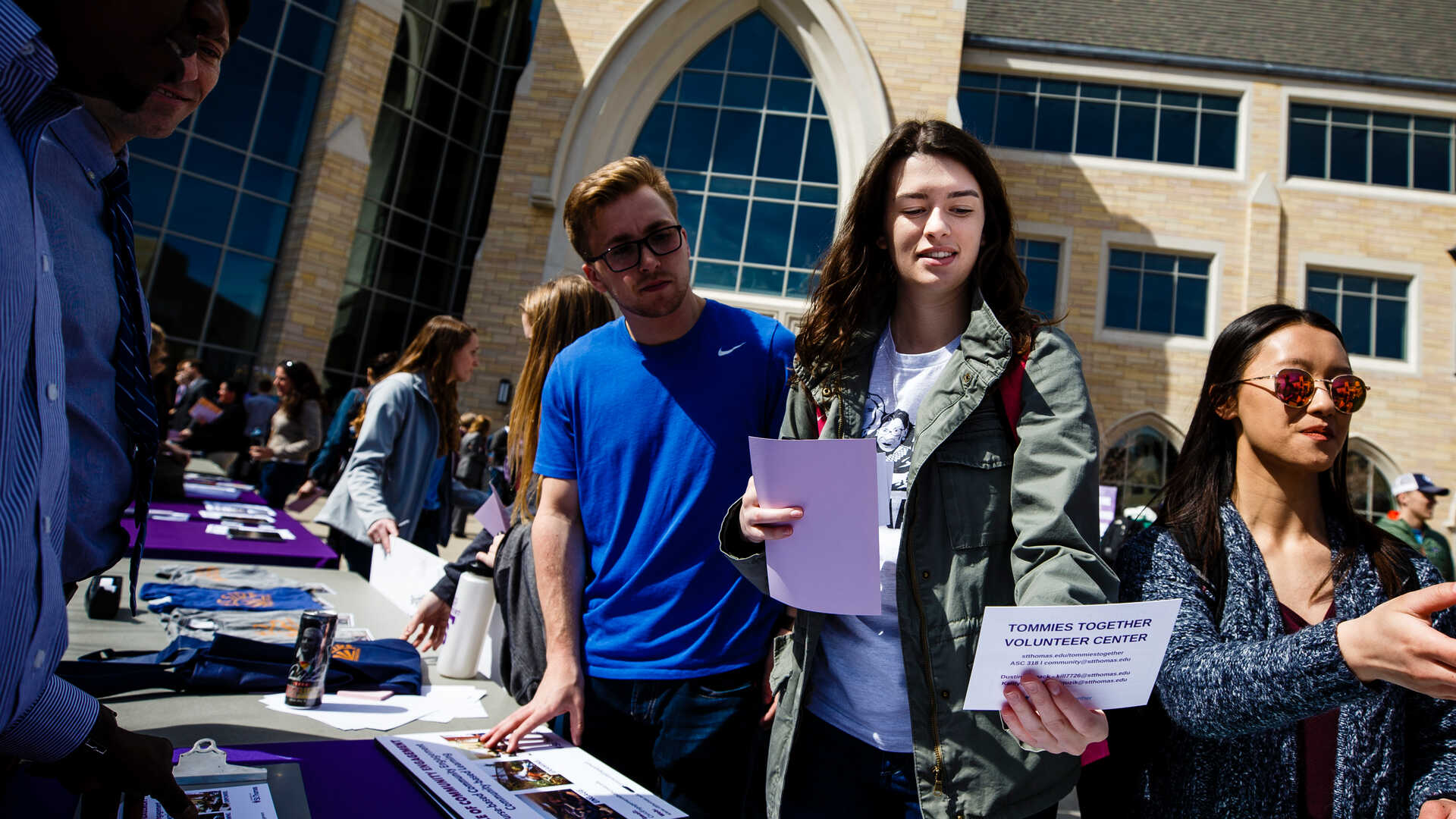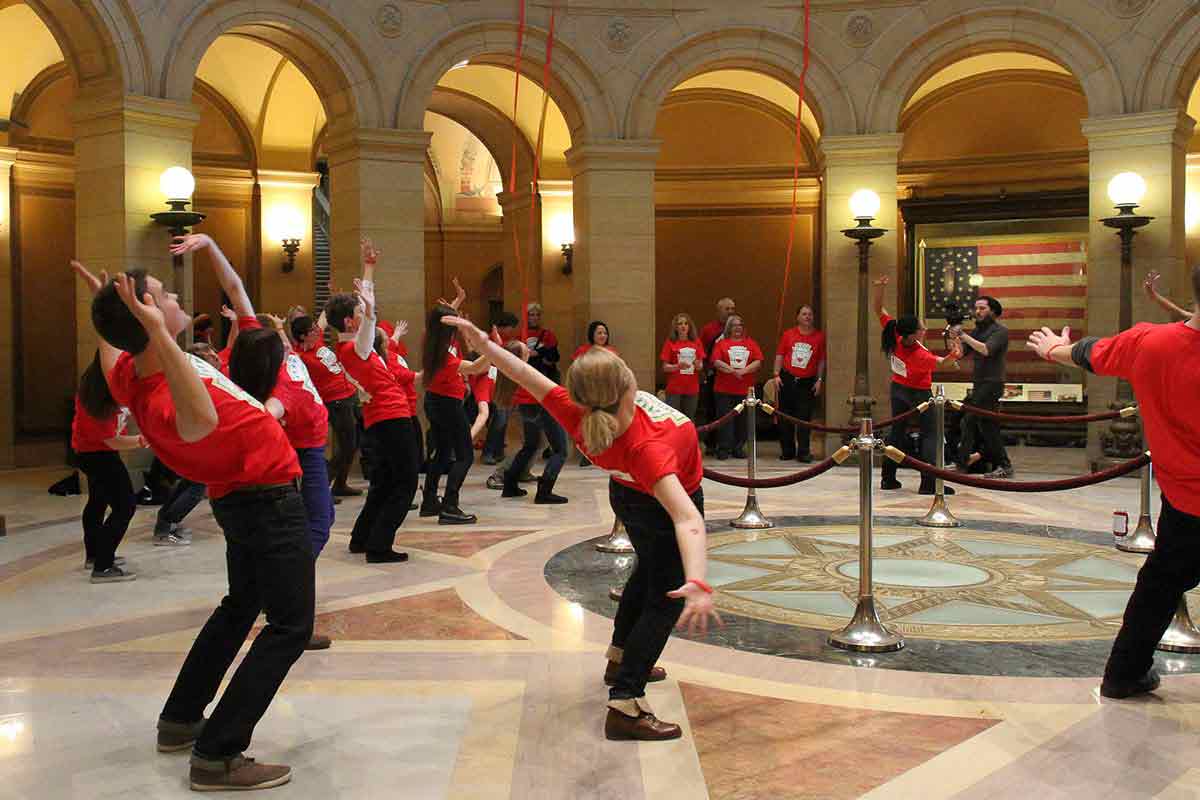of social work majors gain real-world practice experience during more than 450 hours of field education (internships).
Bachelor's in Social Work
At the University of St. Thomas, social work is seen as a critical part of health & well-being for individuals, communities and society. Social work is one of the fastest growing careers in the U.S. We prepare you to become a licensed professional, equipped to work in direct practice with children or adults, groups and organizations, or as an advocate for policies to advance the common good. Our graduates are committed to social justice and to helping people make positive changes in their lives.
Why Study Social Work at St. Thomas?
With an increase in jobs estimated at 16 percent or higher in the field over the next decade (U.S. Bureau of Labor Statistics), social work offers vast career opportunities. Health care social work, along with mental health and substance abuse social work are among the fastest growing areas, while opportunities to work with children, families and schools are also growing faster than average. With a bachelor’s degree in social work, you can begin work upon graduation or enter a master of social work (MSW) program as an “advanced standing” student, and save a year of time and investment achieving your MSW.
With our bachelor’s degree in social work, you’ll be prepared to work with diverse populations across a wide variety of settings such as schools, health systems, correction centers and social services agencies including child welfare agencies. You will gain real-world practice experience during more than 450 hours of fieldwork (internships), and graduate prepared to take the bachelors-level social work licensure exam in any state.
Program Overview
Course Requirements
You will integrate theory, research and fieldwork to prepare for generalist social work practice. The major consists of 12 courses (44 credits) along with four supporting courses (16 credits) in psychology, sociology and biology. Through coursework, you will develop knowledge and skills in social welfare policy and advocacy, community outreach, communication and interviewing, group work skills, case management and basic counseling, research, and strengths-based intervention and support for individuals, families and communities.
Declaring Your Major
In order to declare your social work major, you'll follow these steps:
- Log in to OneStThomas (the intranet for everything St. Thomas students need online)
- Go to the My Actions menu
- Select Major and Minor Declaration Form
- Use buttons to Add or Update a major/minor
- Select "declare," "add," "change" or "remove"
- Make selections using menus provided
- Read and agree to submission acknowledgment
- Submit your request
Students can also find and print the form from the BSW homepage on OneStThomas and deliver it to the Office of Student Data and Registrar.
Four-Year Plan
Social work faculty will work with you to plan a program that meets your needs and allows you to explore your interests. Early advising is especially important if you are considering a co-major degree, a minor, or a study abroad experience. Our four-year degree planning guide provides an overview of course sequencing. You will take some social work courses prior to admission to the major in the spring of your junior year.
Degrees Awarded
- Bachelor's in Social Work (BSW)
- Social Work/Psychology co-major
- Social Work/Sociology co-major
- Social Work/Criminal Justice co-major
- Social Welfare minor
For information on co-major requirements, contact the BSW program director at socialwork@stthomas.edu.
Accelerate Your Path to a Master’s Degree
Bachelor of social work graduates interested in advanced social work practice, including providing mental health counseling, clinical services, program management and public policy, can earn a master’s degree in one year instead of two by entering most master of social work (MSW) degree programs with “advanced standing.” High-achieving juniors interested in clinical social work can apply for accelerated admission to the St. Thomas MSW and enjoy a seamless transition to graduate school.
Scholarships Overview
There is a strong need for social workers equipped to work with our increasingly diverse, aging, and undeserved communities throughout our region. The following financial resources are available to qualifying social work students:
- Minority Scholarship: The School of Social Work is committed to diversifying the profession and offers Social Work Minority Undergraduate Student Scholarships to qualifying social work majors.
- State and federal loan forgiveness/repayment programs: Some social work careers qualify for federal and state loan forgiveness and repayment programs for public service or health service professionals.
Course Requirements
Course Requirements
You will integrate theory, research and fieldwork to prepare for generalist social work practice. The major consists of 12 courses (44 credits) along with four supporting courses (16 credits) in psychology, sociology and biology. Through coursework, you will develop knowledge and skills in social welfare policy and advocacy, community outreach, communication and interviewing, group work skills, case management and basic counseling, research, and strengths-based intervention and support for individuals, families and communities.
Declaring Your Major
Declaring Your Major
In order to declare your social work major, you'll follow these steps:
- Log in to OneStThomas (the intranet for everything St. Thomas students need online)
- Go to the My Actions menu
- Select Major and Minor Declaration Form
- Use buttons to Add or Update a major/minor
- Select "declare," "add," "change" or "remove"
- Make selections using menus provided
- Read and agree to submission acknowledgment
- Submit your request
Students can also find and print the form from the BSW homepage on OneStThomas and deliver it to the Office of Student Data and Registrar.
Four-Year Plan
Four-Year Plan
Social work faculty will work with you to plan a program that meets your needs and allows you to explore your interests. Early advising is especially important if you are considering a co-major degree, a minor, or a study abroad experience. Our four-year degree planning guide provides an overview of course sequencing. You will take some social work courses prior to admission to the major in the spring of your junior year.
Degrees Awarded
Degrees Awarded
- Bachelor's in Social Work (BSW)
- Social Work/Psychology co-major
- Social Work/Sociology co-major
- Social Work/Criminal Justice co-major
- Social Welfare minor
For information on co-major requirements, contact the BSW program director at socialwork@stthomas.edu.
Accelerate Your Path to a Master’s Degree
Accelerate Your Path to a Master’s Degree
Bachelor of social work graduates interested in advanced social work practice, including providing mental health counseling, clinical services, program management and public policy, can earn a master’s degree in one year instead of two by entering most master of social work (MSW) degree programs with “advanced standing.” High-achieving juniors interested in clinical social work can apply for accelerated admission to the St. Thomas MSW and enjoy a seamless transition to graduate school.
Scholarships Overview
Scholarships Overview
There is a strong need for social workers equipped to work with our increasingly diverse, aging, and undeserved communities throughout our region. The following financial resources are available to qualifying social work students:
- Minority Scholarship: The School of Social Work is committed to diversifying the profession and offers Social Work Minority Undergraduate Student Scholarships to qualifying social work majors.
- State and federal loan forgiveness/repayment programs: Some social work careers qualify for federal and state loan forgiveness and repayment programs for public service or health service professionals.
BSW Mission
Grounded in social justice and enriched by the liberal arts, we educate students to advance the common good through generalist social work practice that values human relationships, community engagement, and systems change.
Advocates for Change
Social workers change lives and change the world—one person, one family, one community at a time.
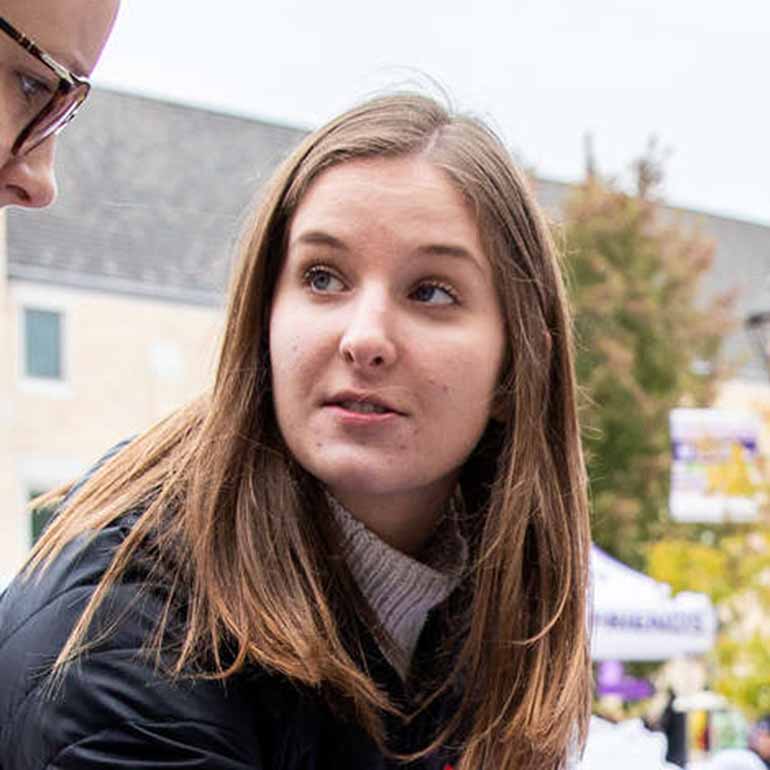
Kelsey DiBias, BSW ’19
In the fall of 2018, Kelsey DiBias joined Dr. Katharine Hill’s Campus Election Engagement Project (CEEP) as a volunteer fellow to help encourage young people to vote. DiBias worked with Hill and CEEP fellow Sofia Leyva throughout the semester to get students registered to vote, and to provide sample ballots, candidate guides and information on how to vote in line with your values. “Turning up to vote, especially as a young person, is critical,” DiBias said. “The political climate could easily be changed if young people showed up to vote for what we believe in.”
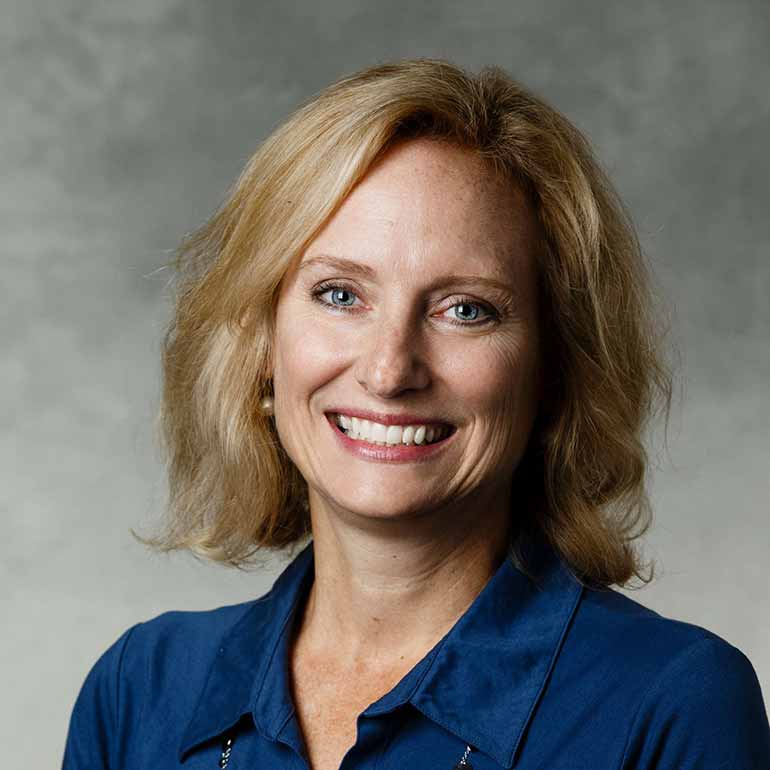
Melissa Lundquist, MSW, PhD, LGSW
Dr. Melissa Lundquist believes a global, cross-cultural perspective is extremely valuable in the social work field because it teaches students to navigate a world different from their own. Recently she traveled the globe in search of study abroad opportunities to benefit our social work students. As a result, St. Thomas soon will spearhead two opportunities for social work majors with the University of Botswana and the University of Cape Town in South Africa.

Andy Qualy BSW ’16, MSW ’18
As a bachelor of social work (BSW) student, U.S. Army veteran Andy Qualy called on his passion for ice hockey to help disabled veterans make the transition back to civilian life, founding the Minnesota Warriors hockey team. After earning his BSW, Andy joined the MSW Area of Emphasis in Military Practice scholars program and presented his research,"The Impact of Minnesota Warriors Hockey on Post-Military Service Reintegration: A Pilot Study" at the 2018 Military Social Work Conference.

Career Paths
- Child welfare and family social work
- Healthcare and medical social work
- Gero-social work (practice with older adults)
- Mental and behavioral health
- Addiction and recovery
- School social work
- Advocacy, community organizing and social administration
- Mental health counseling or therapy (requires master’s degree)
Quick Facts
Our graduates' average pass rate on the state licensing exam
higher median earnings can be expected in the Twin Cities metro area than the national average.
(EMSI Q2 2017 data)
Faculty With Real Experience

Melissa Lundquist, Associate Professor, BSW Program Director
"As a social work educator, I strive to combine real world practice experience with social work knowledge, values, and skills in the classroom."
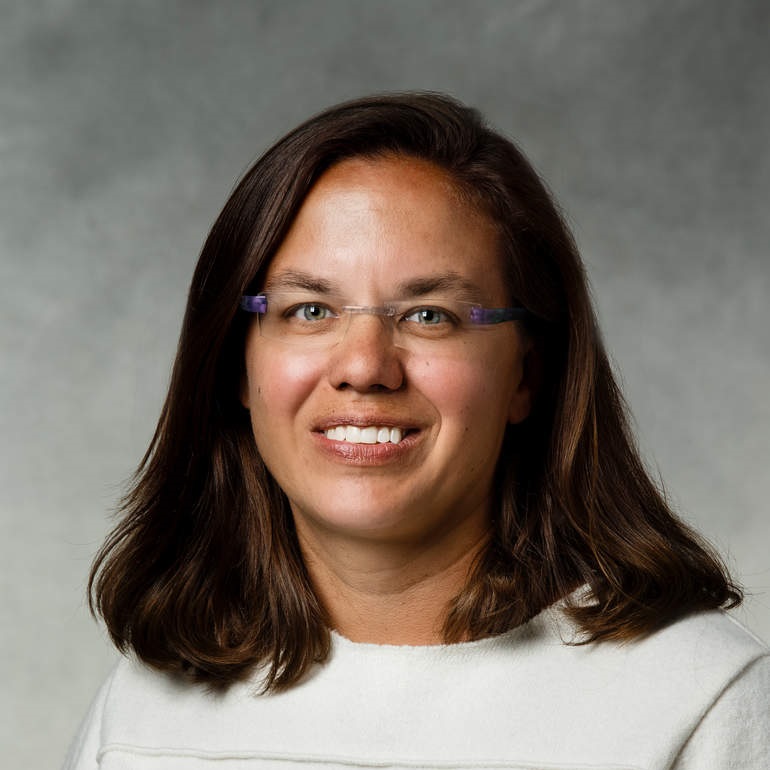
Renee Hepperlen, Associate Professor, Interim BSW Program Director
"I'm really interested in making sure that students have the knowledge and skills and capacities to be able to go and be effective social workers."
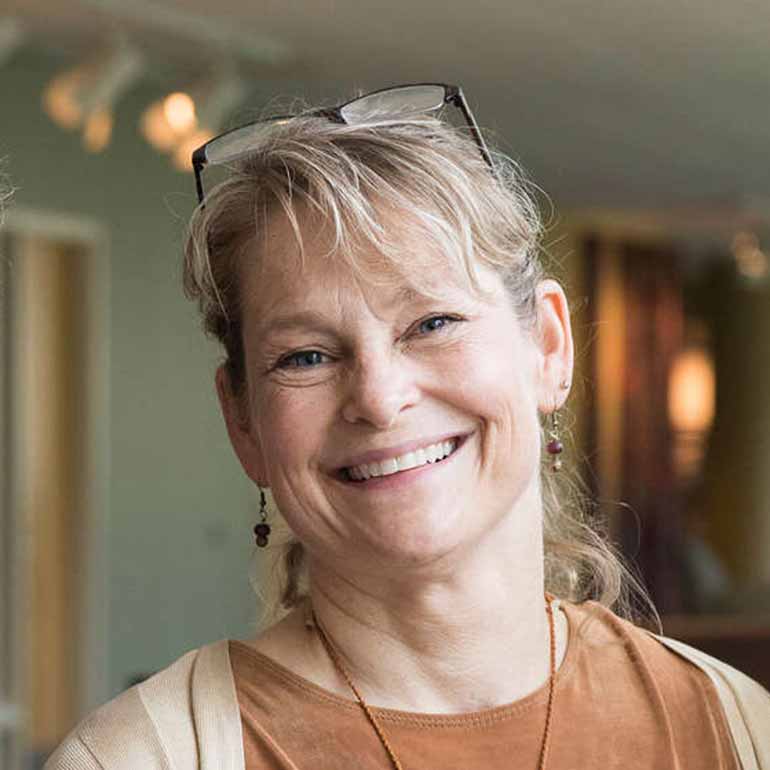
Eva Solomonson, BSW Field Director
"My practice and research interests relate to best practices to serve refugees and immigrants, providing cross cultural care, and working with trauma."
Field Education: Real-World Experience
The Grounding of the Social Work Profession
Social Justice
Social justice is written into the code of ethics of the profession.
Liberal Arts
A liberal arts focus on critical inquiry, problem solving and communication skills are essential elements of the social work curriculum. Prerequisites include coursework in sociology, psychology, and human biology.
Applied Research and Continuing Education
Grounded in applied research and continuing education, Social work is not a static discipline. You will participate in continuing education throughout your career to maintain professional licensure.
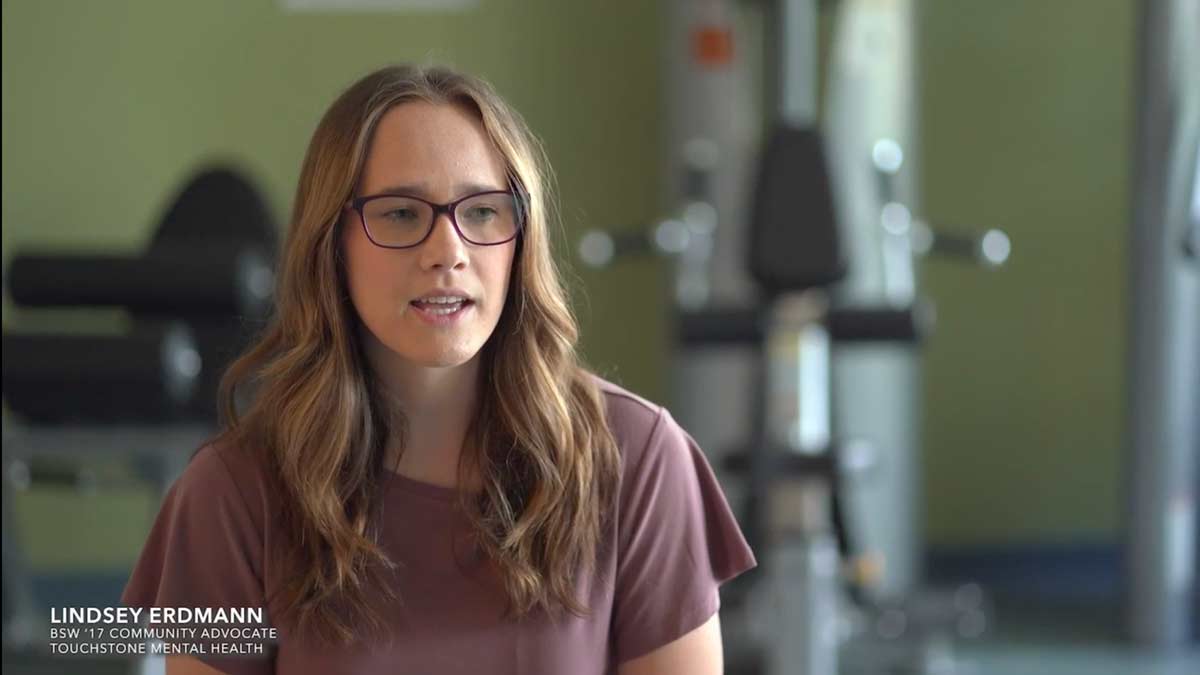
Make a Difference in Others' Lives
BSW students are prepared for licensure and equipped for generalist social work practice to restore and enhance the social functioning of individuals, families, groups, organizations, and communities; and to promote a more just society. Field education in agency settings is a critical component of your social work education.
Accreditation
The University of St. Thomas social work program was first accredited as a joint program (with St. Catherine University) in 1975 from the Council on Social Work Education (CSWE). Since that time, the School of Social Work successfully obtained reaffirmation of accreditation through 2019. After the dissolution of the joint program, the St. Thomas BA in Social Work and Master of Social Work programs earned independent accreditation in 2019.
BA in Social Work: Assessment of Student Learning Summaries
2012: St. Kate's-St. Thomas
2013: St. Kate's-St. Thomas
2014: St. Kate's-St. Thomas
2015: St. Kate's-St. Thomas
2017: St. Kate's-St. Thomas
2018-19: St. Thomas
2019-20: St. Thomas
2021-22: St. Thomas
2023-24: St. Thomas
Licensure Disclosure
Social work is a licensed profession. Each state's licensing body establishes its own rules and regulations for getting and maintaining social work licensure in that state. The Association of Social Work Boards (ASWB) provides the licensing examinations required. There are four ASWB tests: Bachelors, Masters, Advanced Generalist, and Clinical. Social work students should check with the licensing body in each state in which they plan to practice social work to make sure they are clear about the licensing requirements in that state. ASWB maintains complete contact information for every licensing board on their webpage of social work regulatory boards.
Please review the University of St. Thomas' professional licensure disclosure for the Bachelor of Arts in Social Work.
Take the Next Step
 There is more to learn about St. Thomas; including our ranking as a Best Value School by U.S. News & World Report, the many classroom and extracurricular activities that will be part of your student experience and so much more. Schedule a visit to see our beautiful campus or start your application today.
There is more to learn about St. Thomas; including our ranking as a Best Value School by U.S. News & World Report, the many classroom and extracurricular activities that will be part of your student experience and so much more. Schedule a visit to see our beautiful campus or start your application today.
